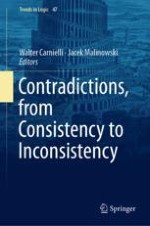2018 | OriginalPaper | Buchkapitel
Provided You’re not Trivial: Adding Defaults and Paraconsistency to a Formal Model of Explanation
verfasst von : David Gaytán, Itala M. Loffredo D’Ottaviano, Raymundo Morado
Erschienen in: Contradictions, from Consistency to Inconsistency
Aktivieren Sie unsere intelligente Suche, um passende Fachinhalte oder Patente zu finden.
Wählen Sie Textabschnitte aus um mit Künstlicher Intelligenz passenden Patente zu finden. powered by
Markieren Sie Textabschnitte, um KI-gestützt weitere passende Inhalte zu finden. powered by
